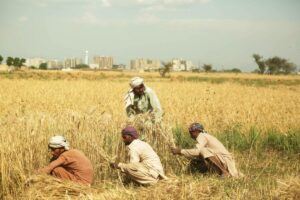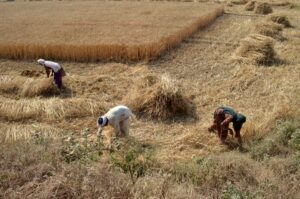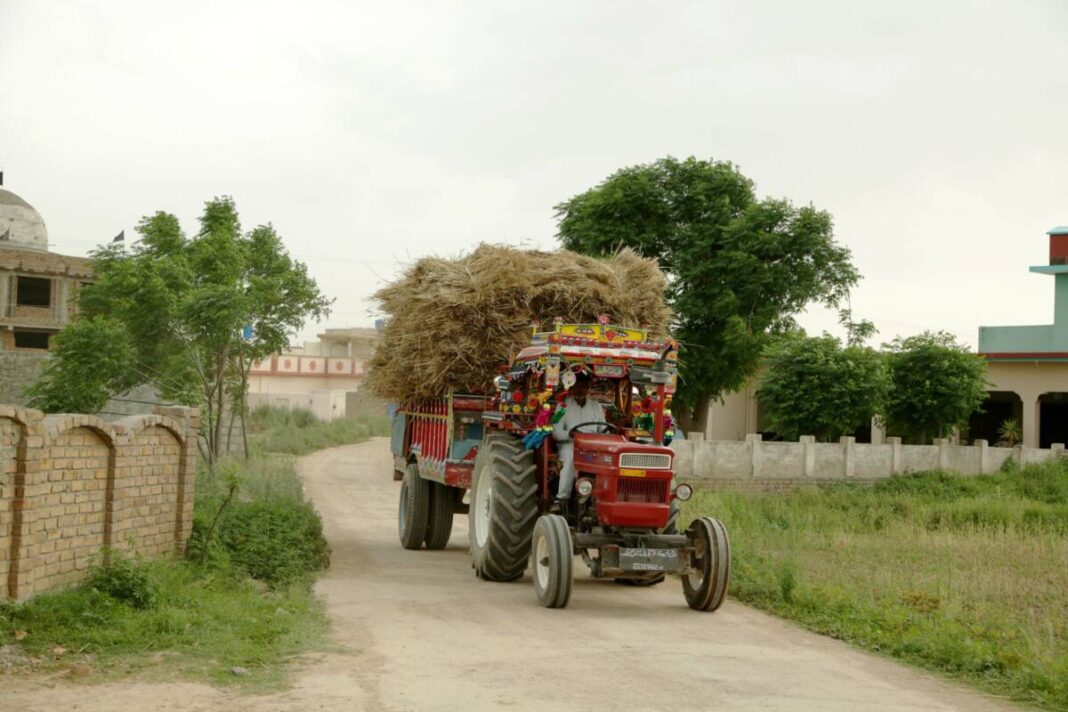With limited infrastructure and a lack of technical awareness among residents, Islamabad’s plan to introduce a complicated biometric system for wheat distribution seems poised to further complicate the already challenging situation in the region, writes Dr. Sakariya Kareem
In yet another move to tighten its control over local food resources in the occupied Gilgit-Baltistan region, Islamabad has decided to digitalise the wheat distribution network. This decision has sparked dissent among representatives of Awami Tehreek, as well as various Non-Governmental Organisations (NGOs) and social groups, who argue that the digitalization and accompanying survey will not alleviate the food crisis—especially the shortage of wheat—in the occupied territory. Instead, they believe it will complicate matters for the local population.
Notably, over the past year, massive protests have erupted in Gilgit-Baltistan against Islamabad’s decision to reduce the wheat subsidy. Reports suggest that the primary aim of the proposed biometric system is to centralize the federal control over wheat distribution in the region, further diminishing the authority of the people over local food resources. This move could potentially allow Islamabad to divert some of the region’s wheat supply to mainland provinces in Pakistan.
For decades, Gilgit-Baltistan has been deliberately deprived of technological advancements and reliable internet connectivity. With limited infrastructure and a lack of technical awareness among residents, Islamabad’s plan to introduce a complicated biometric system for wheat distribution seems poised to further complicate the already challenging situation in the region.
This move follows a clear pattern in Pakistan’s efforts to tighten its illegitimate control over the occupied territory, including imposing unconstitutional taxes, cutting subsidies, and occupying lands. Amid an unprecedented economic crisis, Pakistan is struggling to control food inflation and provide essential items like wheat, rice, and cooking oil to its mainland provinces. This has sparked anger among people and caused deep concern among the country’s political and military elites. In response, the federal government has been attempting to divert Gilgit-Baltistan’s share of food supplies, particularly to meet the demands of people in Punjab.

In the 1970s, the Pakistani government introduced a wheat subsidy in Gilgit-Baltistan, enabling residents to purchase wheat at one-fourth of the global market price. However, in January of this year, the government raised wheat prices from PKR 20 to PKR 36 per kilogram (0.13 USD)—an 80% increase—with plans to further hike the price to PKR 52 per kilogram (0.19 USD). This steep increase triggered widespread protests in the region, including shutter-down strikes, border closures, and crackdowns by Pakistan’s security agencies against local leaders and human rights activists. Despite these harsh measures, protests continue to erupt in the region over various issues, reflecting the ongoing unrest and growing unpopularity of the illegal Pakistani rule in Gilgit-Baltistan.
It is noteworthy that in Pakistan, billions of rupees in subsidies are allocated annually to elite industrialists, including sectors such as fertilizers, cement, transportation, and water tube wells. Meanwhile, federal authorities cite “financial constraints” as a reason to cut wheat subsidies in Gilgit-Baltistan, disproportionately impacting low-income and working-class residents. This double standard underscores the economic disparity and the neglect faced by the region.
Furthermore, mainstream media in Pakistan is prohibited from covering protests in Gilgit-Baltistan, and frequent internet shutdowns severely restrict the flow of information on social media. These oppressive measures by the military establishment are designed to hide human rights violations against ethnic and religious minorities across the country, particularly in regions like Pakistan-Occupied Kashmir (PoK), Balochistan, and Khyber Pakhtunkhwa.
State repression in Gilgit-Baltistan has notably escalated in recent years, particularly after the official announcement of the China-Pakistan Economic Corridor (CPEC) in 2015. The main CPEC route runs through Gilgit-Baltistan, making it a strategically important region for China as well. To ensure a clear land route for Chinese trade activities, the region has been militiarized to crack down on protests and increasing surveillance on the residents of Gilgit-Baltistan. This heightened control reflects the broader strategy to secure the region for economic and geopolitical interests at the expense of local autonomy and human rights.
For years, the people of Gilgit-Baltistan have seen their lands and rare mineral resources taken by Pakistani state authorities and Chinese companies. Now, the government in Islamabad is targeting their subsidies and critical food supplies, such as wheat. A few months ago, the so-called government of Gilgit-Baltistan introduced the wheat digitization initiative, claiming it was “an effort to modernize wheat and flour distribution in the region.” However, critics are skeptical of the local government’s intentions, which is compromised to its “masters” in Islamabad and questioning the sudden push for a biometric system.

One local resident expressed frustration, saying, “I do not understand why the government is proposing measures that cannot be supported by the current infrastructure. This is not the first, nor will it be the last time such impractical initiatives are taken. Our lands don’t even have reliable internet services, so how will the system handle the digitization of such records?” The pattern remains the same: state authorities in Pakisatn promise concessions during negotiations, issue a different notification afterward, and ultimately deliver nothing to the people of Gilgit-Baltistan.
The Food Department of Gilgit-Baltistan’s notification on the digitization process claims that “with the deployment of tablets, dealers will now have the capability to collect real-time data, monitor inventory levels, and ensure the seamless flow of essential commodities to citizens across Gilgit-Baltistan.” In reality, this move appears to be an attempt by state authorities to closely monitor and potentially manipulate the wheat inventory in the region through skewed data and numbers.
Given the limited understanding of the new technology among locals, there is a risk that residents of Gilgit-Baltistan may lose their rightful share of wheat to other provinces in Pakistan. These oppressive tactics are likely to face strong resistance from local organizations like the Awami Action Committee (AAC), which has already expressed concerns about the proposed digitization system. The AAC, along with other groups, may once again rally to defend the region’s rights against what they see as an unjust and harmful policy.

